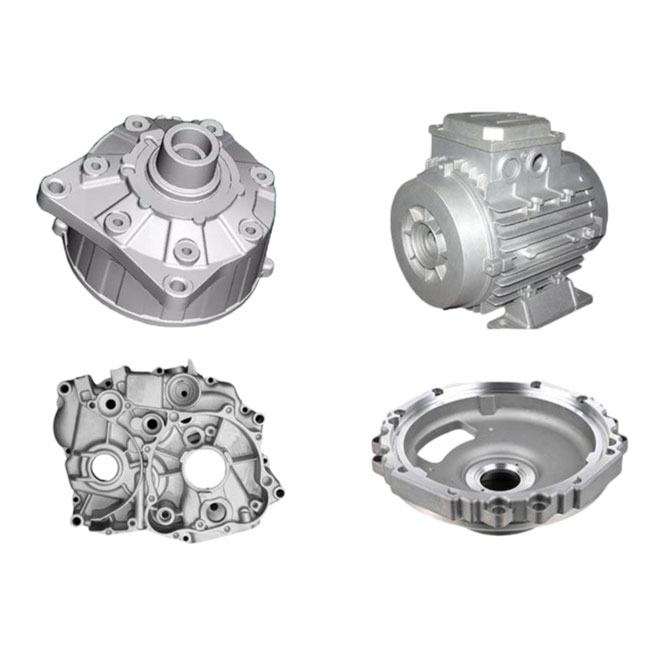
OEM Aluminum Die Casting Factory.
Our intention should be to fulfill our consumers by offering golden provider, superior price and superior quality for High Quality China Youlin® Aluminum Die Casting, We sincerely welcome domestic and foreign retailers who calls, letters inquiring, or to crops to barter, we'll supply you high-quality merchandise as well as the most enthusiastic company,We look forward in your go to and your cooperation.
High Quality China Aluminum Die Casting, We mainly sell in wholesale, with the most popular and easy ways of making payment, which are paying via Money Gram, Western Union, Bank Transfer and Paypal. For any further talk, just feel free to contact our salesmen, who are definitely good and knowledgeable about our products.
1.What is Aluminum Die Castings
 Aluminum die casting alloys are lightweight and possess high dimensional stability for complex part geometries and thin walls. Aluminum withstands good corrosion resistance and mechanical properties as well as high thermal and electrical conductivity, making it a good alloy for die casting. Low-density aluminum metals are essential to the die casting industry. The Youlin® Aluminum Die Casting process retains a durable strength at very high temperatures, requiring the use of cold chamber machines. The molten metal is still contained in an open holding pot which is placed into a furnace, where it is melted to the necessary temperature. The open holding pot is kept separate from the die casting machine and the molten metal is ladled from the pot for each casting because these high temperatures would damage the normal pumping system. The pressure requirements for cold chamber castings are typically higher than those of hot chamber die castings.
Aluminum die casting alloys are lightweight and possess high dimensional stability for complex part geometries and thin walls. Aluminum withstands good corrosion resistance and mechanical properties as well as high thermal and electrical conductivity, making it a good alloy for die casting. Low-density aluminum metals are essential to the die casting industry. The Youlin® Aluminum Die Casting process retains a durable strength at very high temperatures, requiring the use of cold chamber machines. The molten metal is still contained in an open holding pot which is placed into a furnace, where it is melted to the necessary temperature. The open holding pot is kept separate from the die casting machine and the molten metal is ladled from the pot for each casting because these high temperatures would damage the normal pumping system. The pressure requirements for cold chamber castings are typically higher than those of hot chamber die castings.
2.Benefits of Aluminum Die Castings
 ◆Are lightweight yet offer very good strength, hardness and rigidity
◆Are lightweight yet offer very good strength, hardness and rigidity
◆Withstand higher operating temperatures than any other die cast alloy
◆Have corrosion resistance and EMI/RFI shielding properties
◆Offer more surface finishing options than other die cast alloys
◆Provide high thermal and electrical conductivity
◆Are fully recyclable
3.Applications for Aluminum Die Castings
Aluminum castings improve automotive fuel efficiency by contributing to weight saving requirements.
Aluminum is used in a broad range of networking and infrastructure equipment in the telecom and computing industries because RF filter boxes and housings require heat dissipation.
In handheld devices, aluminum castings provide EMI/RFI shielding, rigidity, and durability with minimal weight.
Because of aluminum’s excellent electrical performance and shielding properties, even in high-temperature environments, die cast aluminum is ideal for electronic connectors and housings.
4.4 Steps for High-Pressure Aluminum Die Casting Process

5.Machining and Finishing Options for Aluminum Die Castings
Die cast aluminum parts often require minimal machining, and several options are available for surface finishing. Die casting has a very good surface finish by casting standards but can still have imperfections, like metal seams where the mold halves meet. A rough surface or other imperfections inadequate for the part can be addressed by sanding, sandblasting, or orbital sanding.
The cold working process of shot peening is often used on die cast aluminum to improve fatigue resistance. Alternatively, a protective or decorative coating can be applied to the finished part, such as a powder coat. Other types of modifications can also be applied to the parts after casting, such as drill tapping.
6.FAQ
Q: Why aluminum is used in die casting?
A: One of the most significant benefits of Youlin® aluminum die casting is that it creates lighter parts—with more surface finishing options than other die cast alloys. Moreover, cast aluminum is versatile, corrosion resistant; it retains high dimensional stability with thin walls and can be used in almost any industry.
Q: What aluminum is used for die casting?
A: A few of the most commonly used aluminum alloys for die casting are A380, 383, B390, A413, A360, and CC401. The primary consideration when choosing an appropriate alloy is your intended application. For example, A360 offers excellent corrosion resistance, pressure tightness, and very good fluidity when molten. For example:
A360 offers excellent corrosion resistance, pressure tightness, and very good fluidity when molten.
B390 offers outstanding wear resistance and high hardness while having the lowest ductility of all cast alloys, which is why it is used for applications such as automotive engine blocks.
A380 is the perfect jack-of-all-trades, offering a good combination of casting and product properties, and is the most commonly specified alloy for casting a wide variety of products.
Q: What is the difference between casting and die casting?
A: The biggest and most obvious difference between the die and sand casting process is the materials used to form the molds. Die casting uses a metal mold, while sand casting uses a mold made out of sand.